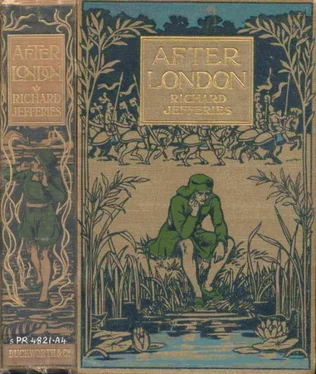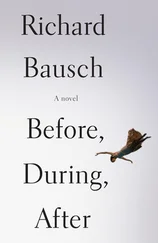Richard Jefferies - After London
Здесь есть возможность читать онлайн «Richard Jefferies - After London» весь текст электронной книги совершенно бесплатно (целиком полную версию без сокращений). В некоторых случаях можно слушать аудио, скачать через торрент в формате fb2 и присутствует краткое содержание. Город: London, Год выпуска: 1905, Издательство: Duckworth & Co., Жанр: sf_postapocalyptic, на английском языке. Описание произведения, (предисловие) а так же отзывы посетителей доступны на портале библиотеки ЛибКат.
- Название:After London
- Автор:
- Издательство:Duckworth & Co.
- Жанр:
- Год:1905
- Город:London
- ISBN:нет данных
- Рейтинг книги:4 / 5. Голосов: 1
-
Избранное:Добавить в избранное
- Отзывы:
-
Ваша оценка:
- 80
- 1
- 2
- 3
- 4
- 5
After London: краткое содержание, описание и аннотация
Предлагаем к чтению аннотацию, описание, краткое содержание или предисловие (зависит от того, что написал сам автор книги «After London»). Если вы не нашли необходимую информацию о книге — напишите в комментариях, мы постараемся отыскать её.
(1885), set in a future in which urban civilization has collapsed after an environmental crisis.” (From
).
This eBook is for the use of anyone anywhere at no cost and with almost no restrictions whatsoever. You may copy it, give it away or re-use it under the terms of the Project Gutenberg License included with this eBook or online at
* * *
After London — читать онлайн бесплатно полную книгу (весь текст) целиком
Ниже представлен текст книги, разбитый по страницам. Система сохранения места последней прочитанной страницы, позволяет с удобством читать онлайн бесплатно книгу «After London», без необходимости каждый раз заново искать на чём Вы остановились. Поставьте закладку, и сможете в любой момент перейти на страницу, на которой закончили чтение.
Интервал:
Закладка:
Felix afterwards acknowledged these things to himself, but at the moment, full of admiration for the bravery of the four knights and their followers, he was full of indignation, and uttered his views too freely. His fellow-grooms cautioned him; but his spirit was up, and he gave way to his feelings without restraint. Now, to laugh at the king’s weaknesses, his gluttony or follies, was one thing; to criticise his military conduct was another. The one was merely badinage, and the king himself might have laughed had he heard it; the other was treason, and, moreover, likely to touch the monarch on the delicate matter of military reputation.
Of this Felix quickly became aware. His mates, indeed, tried to shield him; but possibly the citizen, his master, had enemies in the camp, barons, perhaps, to whom he had lent money, and who watched for a chance of securing his downfall. At all events, early the next day Felix was rudely arrested by the provost in person, bound with cords, and placed in the provost’s booth. At the same time, his master was ordered to remain within, and a guard was put over him.
CHAPTER XX
IN DANGER
Hope died within Felix when he thus suddenly found himself so near the executioner. He had known so many butchered without cause, that he had, indeed, reason to despair. Towards the sunset he felt sure he should be dragged forth and hanged on the oak used for the purpose, and which stood near where the track from Aisi joined the camp. Such would most probably have been his fate, had he been alone concerned in this affair, but by good fortune he was able to escape so miserable an end. Still, he suffered as much as if the rope had finished him, for he had no means of knowing what would be the result.
His heart swelled with bitterness; he was filled with inexpressible indignation, his whole being rebelled against the blundering, as it were, of events which had thus thrown him into the jaws of death. In an hour or two, however, he sufficiently recovered from the shock to reflect that most probably they would give him some chance to speak for himself. There would not be any trial; who would waste time in trying so insignificant a wretch? But there might be some opportunity of speaking, and he resolved to use it to the utmost possible extent.
He would arraign the unskilful generalship of the king; he would not only point out his errors, but how the enemy could be defeated. He would prove that he had ideas and plans worthy of attention. He would, as it were, vindicate himself before he was executed, and he tried to collect his thoughts and to put them into form. Every moment the face of Aurora seemed to look upon him, lovingly and mournfully; but beside it he saw the dusty and distorted features of the copse he had seen drawn by the horse through the camp. Thus, too, his tongue would protrude and lick the dust. He endured, in a word, those treble agonies which the highly-wrought and imaginative inflict upon themselves.
The hours passed, and still no one came near him; he called, and the guard appeared at the door, but only to see what was the matter, and finding his prisoner safe, at once resumed his walk to and fro. The soldier did not, for his own sake, dare to enter into conversation with a prisoner under arrest for such an offence; he might be involved, or suspected. Had it been merely theft or any ordinary crime, he would have talked freely enough, and sympathized with the prisoner. As time went on, Felix grew thirsty, but his request for water was disregarded, and there he remained till four in the afternoon. They then marched him out; he begged to be allowed to speak, but the soldiery did not reply, simply hurrying him forward. He now feared that he should be executed without the chance being afforded him to say a word; but, to his surprise, he found in a few minutes that they were taking him in the direction of the king’s quarters. New fears now seized him, for he had heard of men being turned loose, made to run for their lives, and hunted down with hounds for the amusement of the Court.
If the citizen’s wealth had made him many enemies (men whom he had befriended, and who hoped, if they could be see him executed, to escape the payment of their debts), on the other hand, it had made him as many friends, that is, interested friends, who trusted by doing him service to obtain advances. These latter had lost no time, for greed is quite as eager as hate, and carried the matter at once to the king. What they desired was that the case should be decided by the monarch himself, and not by his chancellor, or a judge appointed for the purpose. The judge would be nearly certain to condemn the citizen, and to confiscate whatever he could lay hands on. The king might pardon, and would be content with a part only, where his ministers would grasp all.
These friends succeeded in their object; the king, who hated all judicial affairs because they involved the trouble of investigation, shrugged his shoulders at the request, and would not have granted it had it not come out that the citizen’s servant had declared him to be an incapable commander. At this the king started. “We are, indeed, fallen low,” said he, “when a miserable trader’s knave calls us incapable. We will see this impudent rascal.” He accordingly ordered that the prisoner should be brought before him after dinner.
Felix was led inside the entrenchment, unbound, and commanded to stand upright. There was a considerable assembly of the greater barons anxious to see the trial of the money-lender, who, though present, was kept apart from Felix lest the two should arrange their defence. The king was sleeping on a couch outside the booth in the shade; he was lying on his back breathing loudly with open mouth. How different his appearance to the time when he sat on his splendid charger and reviewed his knights! A heavy meal had been succeeded by as heavy a slumber. No one dared to disturb him; the assembly moved on tiptoe and conversed in whispers. The experienced divined that the prisoners were certain to be condemned, for the king would wake with indigestion, and vent his uneasy sensations upon them. Full an hour elapsed before the king awoke with a snort and called for a draught of water. How Felix envied that draught! He had neither eaten nor drunk since the night previous; it was a hot day, and his tongue was dry and parched.
The citizen was first accused; he denied any treasonable designs or expressions whatever; as for the other prisoner, till the time he was arrested he did not even know he had been in his service. He was some stroller whom his grooms had incautiously engaged, the lazy scoundrels, to assist them. He had never even spoken to him; it the knave told the truth he must acknowledge this.
“How now,” said the king, turning to Felix; “what do you say?”
“It is true,” replied Felix, “he has never spoken to me nor I to him. He knew nothing of what I said. I said it on my own account, and I say it again!”
“And pray, sir knave,” said the king, sitting up on his couch, for he was surprised to hear one so meanly dressed speak so correctly, and so boldly face him. “What was it you did say?”
“If your majesty will order me a single drop of water,” said the prisoner, “I will repeat it word for word, but I have had nothing the whole day, and I can hardly move my tongue.”
Without a word the king handed him the cup from which he had himself drunk. Never, surely, was water so delicious. Felix drained it to the bottom, handed it back (an officer took it), and with one brief thought of Aurora, he said: “Your majesty, you are an incapable commander.”
“Go on,” said the king sarcastically; “why am I incapable?”
“You have attacked the wrong city; these three are all your enemies, and you have attacked the first. They stand in a row.”
Читать дальшеИнтервал:
Закладка:
Похожие книги на «After London»
Представляем Вашему вниманию похожие книги на «After London» списком для выбора. Мы отобрали схожую по названию и смыслу литературу в надежде предоставить читателям больше вариантов отыскать новые, интересные, ещё непрочитанные произведения.
Обсуждение, отзывы о книге «After London» и просто собственные мнения читателей. Оставьте ваши комментарии, напишите, что Вы думаете о произведении, его смысле или главных героях. Укажите что конкретно понравилось, а что нет, и почему Вы так считаете.












